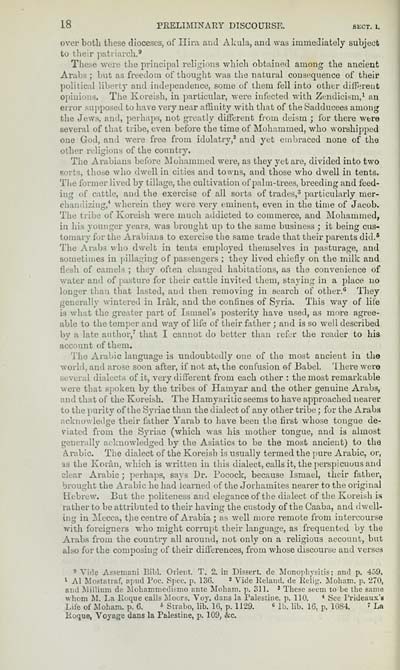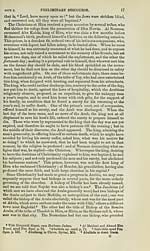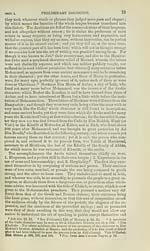Download files
Complete book:
Individual page:
Thumbnail gallery: Grid view | List view

18 PRELIMINARY DISCOURSE. sect. i.
over both these dioceses, of Ilira and Akula, and was immediately subject
to their patriarch.*
These were the principal religions which obtained among the ancient
Arabs ; but as freedom of thought was the natural consequence of their
political libertj- and independence, some of them fell into other diffHreiit
opiuious. The Koi-eish, in particular, were infected with Zi^iidicism,^ an
error sujiposed to have very near affinity with that of the Sadducees among
the Jews, and, perhajis, not greatly different fiom deism ; I'or there were
several of that tribe, even before the time of Mohammed, who worshipped
one God, and were free from idolatry,* and yet embraced none of the
other ri'ligions of the country.
The Arabians before Mohammed were, as they yet are, divided into two
sorts, those who dwell in cities and towns, and those who dwell in tents.
The former lived by tillage, the cultivation of palm-trees, breeding and feed-
ing of cattle, and the exercise of all sorts of trades,'^ particularly mer-
chandizing,* wherein they were very eminent, even in the time of Jacob.
The tribe of Koreish were much addicted to commerce, and IMohammed,
in his younger years, was brought up to the same business ; it being cus-
tomary for the Arabians to exercise the same trade that their parents did.*
The Arabs who dwelt in tents employed themselves in pasturage, and
sotnetimes in i)illaging of passengers ; they lived chiefly on the milk and
fli-sh of camels ; they often changed habitations, as the convenience of
water and of pasture for their cattle invited them, staying in a place no
longer than that lasted, and then removing in search of other.^ They
generally wintered in Irak, and the confines of Syria. This way of life
is what the greater part of Ismael's posterity have used, as more agree-
able to the temper and way of life of their father ; and is so well described
by a late author,' that I cannot do better than refer the reader to his
account of them.
The Arabic language is undoubtedly one of the most ancient in the
world, and arose soon after, if not at, the confusion ef Babel. There were
several dialects of it, very different from each other ; the most remarkable
were that sjioken by the tribes of Hamyar and the other genuine Arabs,
and that of the Koreish. The Hamyaritic seems to have approached nearer
to the purity of the Syriac than the dialect of any other tribe ; for the Arabs
acknowledge their father Yarab to have been tlie first whose tongue de-
viated from the Syriac (which was his mother tongue, and is almost
generally acknowledged by the Asiatics to be the most ancient) to the
A-Kibic. The dialect of the Koreish is usually termed the jmre Arabic, or,
as the Koran, which is written in this dialect, calls it, the jier-spicuous and
clear Arabic ; perhaps, says Dr. Pocock, because Ismael, their father,
brought the Arabic he had learned of the Jorhamites nearer to the original
Hebrew. But the politeness and elegance of the dialect of the Koreish is
rather to be attributed to their having the custody of the Caaba, and dwell-
ing in Mecca, the centre of Arabia ; as well more remote from intercourse
■with foreigners who might cori-ui)t their language, as frequented by the
Arabs from the countiy all around, not only on a religious account, but
also for the composing of their differences, from whose discourse and verses
* Vide Assemani Bibl. Orient. T. 2. in Dissert, de Monophysitis; and p. 459.
* Al Mostatraf, a))ud Poc. Spec. p. 136. " Vide Reland. de Hdig. Moh.iin. p. 270,
and JNlilHum de Mohammedisnio ante Moham. p. 311. ' These seem to be the same
whom M. La Roque calls Moors. Voy, dans la Palestine, p. 110. * See I'rideaux'a
Life of Moham. p, 6. * Strabo, lib. 16, p. 1129. » lb. lib. 16, p. 1084. ? La
Koque, Voyage dans la Palestine, p. 109, &c
over both these dioceses, of Ilira and Akula, and was immediately subject
to their patriarch.*
These were the principal religions which obtained among the ancient
Arabs ; but as freedom of thought was the natural consequence of their
political libertj- and independence, some of them fell into other diffHreiit
opiuious. The Koi-eish, in particular, were infected with Zi^iidicism,^ an
error sujiposed to have very near affinity with that of the Sadducees among
the Jews, and, perhajis, not greatly different fiom deism ; I'or there were
several of that tribe, even before the time of Mohammed, who worshipped
one God, and were free from idolatry,* and yet embraced none of the
other ri'ligions of the country.
The Arabians before Mohammed were, as they yet are, divided into two
sorts, those who dwell in cities and towns, and those who dwell in tents.
The former lived by tillage, the cultivation of palm-trees, breeding and feed-
ing of cattle, and the exercise of all sorts of trades,'^ particularly mer-
chandizing,* wherein they were very eminent, even in the time of Jacob.
The tribe of Koreish were much addicted to commerce, and IMohammed,
in his younger years, was brought up to the same business ; it being cus-
tomary for the Arabians to exercise the same trade that their parents did.*
The Arabs who dwelt in tents employed themselves in pasturage, and
sotnetimes in i)illaging of passengers ; they lived chiefly on the milk and
fli-sh of camels ; they often changed habitations, as the convenience of
water and of pasture for their cattle invited them, staying in a place no
longer than that lasted, and then removing in search of other.^ They
generally wintered in Irak, and the confines of Syria. This way of life
is what the greater part of Ismael's posterity have used, as more agree-
able to the temper and way of life of their father ; and is so well described
by a late author,' that I cannot do better than refer the reader to his
account of them.
The Arabic language is undoubtedly one of the most ancient in the
world, and arose soon after, if not at, the confusion ef Babel. There were
several dialects of it, very different from each other ; the most remarkable
were that sjioken by the tribes of Hamyar and the other genuine Arabs,
and that of the Koreish. The Hamyaritic seems to have approached nearer
to the purity of the Syriac than the dialect of any other tribe ; for the Arabs
acknowledge their father Yarab to have been tlie first whose tongue de-
viated from the Syriac (which was his mother tongue, and is almost
generally acknowledged by the Asiatics to be the most ancient) to the
A-Kibic. The dialect of the Koreish is usually termed the jmre Arabic, or,
as the Koran, which is written in this dialect, calls it, the jier-spicuous and
clear Arabic ; perhaps, says Dr. Pocock, because Ismael, their father,
brought the Arabic he had learned of the Jorhamites nearer to the original
Hebrew. But the politeness and elegance of the dialect of the Koreish is
rather to be attributed to their having the custody of the Caaba, and dwell-
ing in Mecca, the centre of Arabia ; as well more remote from intercourse
■with foreigners who might cori-ui)t their language, as frequented by the
Arabs from the countiy all around, not only on a religious account, but
also for the composing of their differences, from whose discourse and verses
* Vide Assemani Bibl. Orient. T. 2. in Dissert, de Monophysitis; and p. 459.
* Al Mostatraf, a))ud Poc. Spec. p. 136. " Vide Reland. de Hdig. Moh.iin. p. 270,
and JNlilHum de Mohammedisnio ante Moham. p. 311. ' These seem to be the same
whom M. La Roque calls Moors. Voy, dans la Palestine, p. 110. * See I'rideaux'a
Life of Moham. p, 6. * Strabo, lib. 16, p. 1129. » lb. lib. 16, p. 1084. ? La
Koque, Voyage dans la Palestine, p. 109, &c
Set display mode to: Large image | Transcription
Images and transcriptions on this page, including medium image downloads, may be used under the Creative Commons Attribution 4.0 International Licence unless otherwise stated. ![]()
| Early Gaelic Book Collections > J. F. Campbell Collection > Koran: or, Alcoran of Mohammed > (40) |
|---|
| Permanent URL | https://digital.nls.uk/77134535 |
|---|
| Description | Volumes from a collection of 610 books rich in Highland folklore, Ossianic literature and other Celtic subjects. Many of the books annotated by John Francis Campbell of Islay, who assembled the collection. |
|---|
| Description | Selected items from five 'Special and Named Printed Collections'. Includes books in Gaelic and other Celtic languages, works about the Gaels, their languages, literature, culture and history. |
|---|

